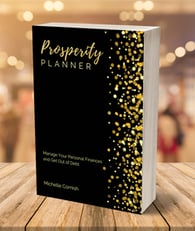Did you notice I purposefully left out a key component of the title? Disagreements with who? You may have guessed partner or spouse, and you would be right, but the reason I left out who you might disagree with is that financial disagreements are just as common in business relationships as they are in personal relationships. They can be just as detrimental to the relationship too.
You've probably heard the statistic that the majority of new businesses fail within their first three to five years of business. But what's not common knowledge, is the reason for their failure: cash flow problems. Often this is due to the mismanagement of cash as a result of disagreements among business partners.
When it comes to personal relationships, finances are also at the top of the list of reasons for dissolving a partnership. There is still a stigma around talking about money and conversations about personal finances are usually happening too late in the relationship. But the key to working out money problems isn't just starting the conversation early, it's also keeping the conversation going throughout your relationship whether it be personal or business in nature.
Communication is Key
The hardest part about having a discussion about your finances is getting started. Once you've opened the door to talking about money, it's easier to keep that door open. And you must keep it open if you want to successfully manage your finances together.
Here are a few things to consider when it comes to keeping the communication lines open around money and personal finances:
- Discuss large purchases beforehand so nobody is surprised,
- Establish time for a regular finance meeting to discuss anything that’s come up since the last meeting,
- Set guidelines for who will pay what bills and when.
Establishing Guidelines and Roles
Deciding who is going to do what when it comes to personal and business finances will go a long way to keeping communication lines open. For example, if one person is assigned the role of bill payer, they are going to know whether there is enough money available to pay the bills. If there isn't, then they need to have a conversation with their partner about where they're going to find the money to pay their bills.
It's also important to establish guidelines such as what you consider a large purchase. To some people, a large purchase is anything over $50. But for other people, this number could be as high as $1,000. It's important to discuss this ahead of time so you and your partner know if you are on the same page.
Weighing Your Banking Options
There's no hard-and-fast rule regarding how to set up your banking when you're in a relationship and sharing financial information. Of course, if this is a business relationship, the business will have its own separate bank account.
On the other hand, when it comes to personal relationships, you are free to set up your banking however you like. What works for you and your partner might not work for another partnership. My friend, Sarah Lentz, wrote a great article about how having separate bank accounts helped her marriage.
Joint Account
With a joint account, you and your partner agree to pool all your money. This means that you are likely also paying for expenses together as well. Where this can sometimes cause problems is when the partners are earning different levels of income that are going into the same bank account.
Some people might feel the money should be spent in the same ratio as it is earned. So, if one partner earns twice as much as the other, some people believe that partner should also pay double the expenses. But there’s also the view that expenses should be split fifty-fifty.
Separate Accounts
In the case where you view a fifty-fifty split of expenses as more fair, separate bank accounts may be more appropriate for you and your partner. This way you each have your own separate account where your money is deposited and then you contribute the same amount towards household expenses. This can sometimes create a lot of extra work (and arguments) in calculating who owes what for which bill.
The Best of Both Worlds
Having a separate bank account and a joint account is what has worked the best for me and my husband. This way we get to keep our independence with our own separate accounts, but we're also able to pay household expenses directly out of the joint accounts, saving the trouble of having to calculate who owes what.
The key in determining how you manage your personal banking depends on your relationship, and it might take a little bit of experimenting to determine what works best for you and your partner. No way is right or wrong, it's simply the way that works best for you.
Be Open to Each Others’ Ideas
Keeping communication lines open when it comes to money also involves keeping an open mind. It's important to hear each other's ideas and consider them. This is a good general rule for life, not just personal finances.
In the beginning of our marriage, my husband was constantly nagging me to create a budget and I kept telling him I had everything under control without considering his point of view. Without a formal budget, he had no way of knowing what was going in and out of our joint bank account unless he logged in and viewed past transactions. This didn't help him prepare for what might be coming in the future like a budget would.
When I stopped to consider my husband's point of view, I realized it wasn't fair for me to try and keep everything in my head—of course he couldn't access it there! Taking the time to prepare a formal budget based on our past expenses was one of the best things I could have done for our personal finances. It was a huge eye-opener for me in terms of what we were spending. Had I not stopped to consider my husband’s point of view, I never would have realized this and adjusted our spending accordingly.
Affirmations
Affirmations are a great way to help you keep an open mind when it comes to discussing your finances. If you're used to being on your own and only having to worry about your own bank account and your own expenses, being in a relationship (personal or business) and sharing finances is a huge adjustment.
Here are some affirmations to help you work through money disagreements.
- I easily communicate my financial desires.
- Together we can reach our financial goals.
- I handle financial differences with ease.
Use these affirmations (or come up with some of your own) every day to help you feel more comfortable discussing finances with your partner.
Journal Prompts
What is my ideal joint finance situation?
Think about this question and write about how you would like your finances to be in a partnership situation. It's okay to write about wanting to control the finances yourself. Some partners don't want to control the finances and they're totally okay with this. This is all about your ideal joint financial situation, so you can write whatever you want. How does it make you feel to combine finances?
What am I willing to compromise?
Most partnerships require compromise of some kind at some point in time. When thinking about this question, write about the things you would be willing to compromise. What sense of control are you willing to let go of for the sake of your relationship?
For the non-negotiables, are there ways we can agree to disagree?
Now, think about the financial things you're not willing to negotiate on. Is there a way you can still make things work in your relationship given these things? Write about your non-negotiables and why it's important to you that they are non-negotiables.
Relationships are a constant work in progress. When it comes to your personal finances, keeping communication lines open and discussing what really matters to you when it comes to your personal finances will go a long way to helping you and your partner build a secure financial future whether it's a personal partnership or a business partnership.
*****
Have you read this Money Matters article? *How Can You Start Solving Money Problems Today?
From Mari:
Please comment below on how this Money Matters column has helped you.
Also, leave your suggestions for future topics you'd like to see discussed.
#JustWRITEON!

Author bio: Michelle Cornish is the author of Prosperity Planner: Manage Your Personal Finances and Get Out of Debt, an undated planner where she shares more about her personal financial journey and her TREE Method for keeping her personal finances in check.
Now On Sale In Our Store!



Leave Comment